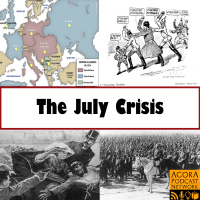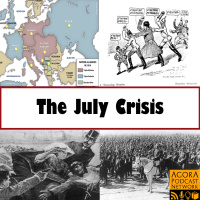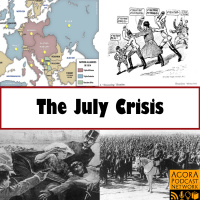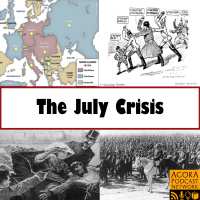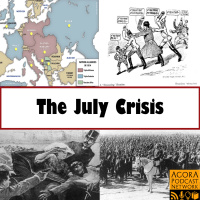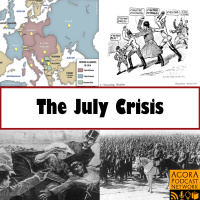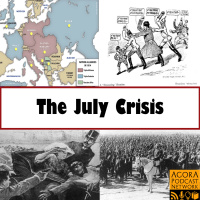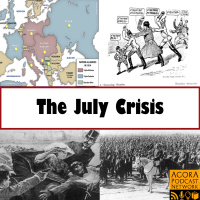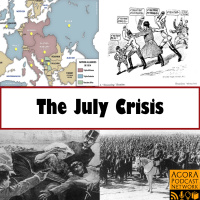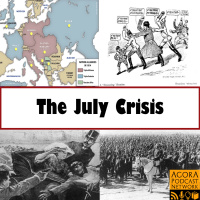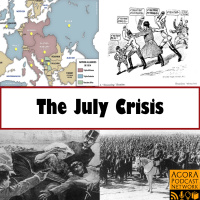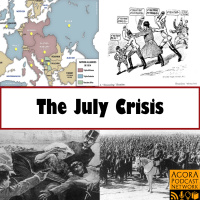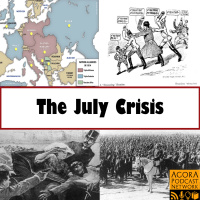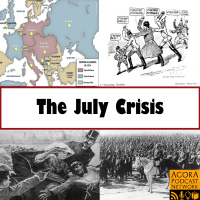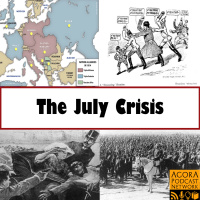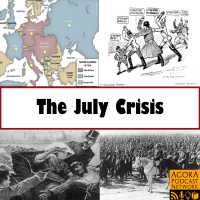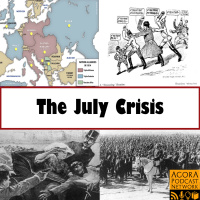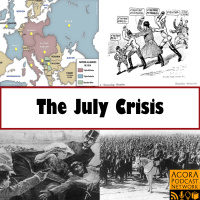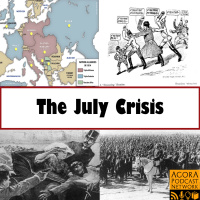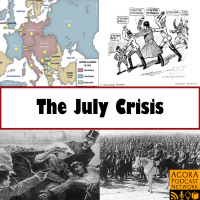Sinopsis
A weekly podcast covering the build up to, breakout of and consequences of various conflicts in history.
Episodios
-
#20: 20-22 July 1914 - France In Russia
12/08/2024 Duración: 38minOn 20 July, the French President, Premier, and other statesmen docked at Kronstadt, aboard the fittingly named France.It began a tremendous spectacle of Franco-Russian cooperation, just as rumours were swirling of Austria's nefarious intentions. The allies could not know for sure what Vienna was planning, but they could send some strongly worded warnings. As the French President attempted to put steel into his allies, his Premier suffered something akin to a breakdown. Perhaps Rene Viviani was anxious about domestic politics, or perhaps the pacifist Premier was beginning to realise that a great war was more likely. Either way, once they returned to the sea, French policy would be in the hands of Maurice Paleologue, the French ambassador, and it was hard to see him as anything other than a hawk.Support the July Crisis series, join the conversation, and find out more through these links:Do you want ad-free episodes with scripts attached, and bonus content? Support us on Patreon and you can suggest July Crisis e
-
#19: 19-22 July 1914 - Finalising Fatalism
09/08/2024 Duración: 33minAs the French sailed for St Petersburg, the Austro-Hungarian government gathered in Vienna for a meeting of historic importance. It was here on 19 July 1914 that the infamous ultimatum to Serbia was finalised, but also the question of what kind of war Austria expected to fight. Shockingly, the question of Russian intervention barely registered. The tunnel vision was laser focused on Belgrade, and now that everyone was on the same page, and the pieces in place, nothing could stop Austria-Hungary putting the finishing touches on the most fatalistic policy imaginable. Their decision to move against Serbia was by now an open secret, but amidst the rumour and whisper, the most important step yet towards war had been taken, and this was to take the whole world by surprise.Support the July Crisis series, join the conversation, and find out more through these links:Do you want ad-free episodes with scripts attached, and bonus content? Support us on Patreon and you can suggest July Crisis episodes!Join our Facebook gr
-
#18: 16-20 July 1914 - France at Sea
07/08/2024 Duración: 25minAs the French President and Premier made their way to Russia, on board the France, they tried their best to keep up to date with what was happening outsides the confines of their vessel. Troubling rumours were not hard to come by, but they could not be wholly ignored. The Central Powers kept up a front of ignorance, even luring Sazonov into a false sense of security. Here we see how the allies reacted to the suspicious news, and how close their intelligence sources came to unearthing the truth. Even though they could not quite put their finger on it, Franco-Russian solidarity was the one constant they could feel confident in.Support the July Crisis series, join the conversation, and find out more through these links:Do you want ad-free episodes with scripts attached, and bonus content? Support us on Patreon and you can suggest July Crisis episodes!Join our Facebook group as we make our way through this fascinating series!Click here to see our July Crisis workspace in Perlego, you'll find every source you need
-
#17: 15-18 July 1914 - Secrecy and Haste
05/08/2024 Duración: 54minWith the Austro-Hungarian government on the same page at long last, it remained to follow through with the ultimatum. To Berchtold, this meant moving as quickly and as secretly as possible, so that once the ultimatum arrived in Serbia, Europe would be presented with a fait accompli. The Germans were similarly anxious, and emphasised the necessity of speed. Still, neither Berlin nor Vienna gave much thought to the Russians. Somehow, a comfortable consensus permeated: Russia would not defend Serbia, but if she did, this was the best time to fight her. The more surprised Russia was, the more likely she was to be overtaken by events. Thanks to Berchtold's carelessness and cracked Italian codes, however, the secret did leak out. Here we examine how this happened, and what it meant for the deteriorating situation.Support the July Crisis series, join the conversation, and find out more through these links:Do you want ad-free episodes with scripts attached, and bonus content? Support us on Patreon and you can suggest
-
#16: March-June 1914 - The Entente Part 3
02/08/2024 Duración: 57minIn our final episode looking at the Entente, we bring our story up to the eve of the July Crisis.How had past lessons influenced the way Russia and France interpreted the world by spring 1914? Was war certain? Had new military reforms so affected the balance of power that war was now inevitable? What did the position of Britain mean for the two allies, and why was London so concerned with losing Russia as a friend? Was Germany's effort to match its rivals really sustainable in the long term?The British strategy of balancing between the two blocs was coming to an end, but how would the Germans react to news that Russia was now courting Britain into the Entente? Was Britain truly as free as she imagined, or was the cold reality of the bloc system about to dawn in London? Still, few contemporaries believed war would come - had the peacemakers not saved Europe from war in the past? Perhaps they had, but there was no guarantee that a spark in a sensitive region would not transform the situation.Support the July Cr
-
#15: Jan-March 1914 - The Entente Part 2
31/07/2024 Duración: 01h03minIn our second installment of this Entente analysis, we look at the Liman von Sanders crisis.By late 1913, a new crisis in Russo-German relations centred on the status of General Liman von Sanders, appointed to command the 1st Army Corps at Constantinople. To the Germans, this was a useful way to assert their influence in the Ottoman Empire and rebuild its capabilities after several years of conflict. But to Russia, the appearance of their rival in a theatre earmarked as a sphere of Russian interest seemed akin to a threat. How would Sergei Sazonov react, and did the resolution of the crisis settle differences, or merely establish resentments and mistrust which reverberated right up to the outbreak of the First World War? Please join us, as we examine this forgotten crisis, assess the growing military power of Russia, its relationship with France, and the possibility that Britain might tie itself more securely to its former rivals. The Entente had come a long way, yet it was far from set in stone...Support the
-
#14: 1912-1913 - The Entente Part 1
29/07/2024 Duración: 58minIn this first of three episodes, we look at the pre-war position of the Entente!Before we bring our narrative further, it would be useful to turn our attention to what came before. The Franco-Russian alliance was formed in 1894, and over the next twenty years, the two allies experienced their share of ups and downs. Even as new crises shifted the balance of power, France and Russia stuck together. Russia brought the manpower, and France brought the money and expertise which could project that power. By 1912, certain limits had been set on the alliance, depending on the theatre in question, but Raymond Poincare, Premier and then President of France before the war, worked to remove these breaks, and enhance the alliance. Meanwhile, Russian Foreign Minister Sergei Sazonov distinguished himself. After several ignominious retreats on the world stage, both partners were looking for opportunities to stand firm, and show the Triple Alliance they meant business. The inclusion of Britain might affirm the supremacy of t
-
#13: 13-14 July 1914 - Berchtold Supreme
26/07/2024 Duración: 26minAs Belgrade burned with rage following the death of Ambassador Hartwig, Berchtold was on the verge of his greatest triumph. After several intense weeks of pressure, Stefan Tisza seemed finally to be seeing the light. A combination of factors, including German pressure, agitation from his subordinates, fear of Romania, outrage at Serbia, and probably exhaustion, all moved Tisza to accept a policy of war. Tisza was eager to clarify that this did not render him a hawk - he still wished for peace if this was possible. Yet, he no longer blocked the construction of an ultimatum designed to be impossible for Serbia to accept, and he no longer flew the lonely flag for diplomacy. How had Tisza been persuaded, and what did it mean for Berchtold, to finally have a united Cabinet behind him? Here we consider these critical questions, in a pivotal turning point of the July Crisis.Support the July Crisis series, join the conversation, and find out more through these links:Do you want ad-free episodes with scripts attached,
-
#12: 8-12 July 1914 - Hartwig's Last Act
24/07/2024 Duración: 45minNow that German support had been acquired, and the delivery of an ultimatum to Serbia was virtually guaranteed, Berchtold had one final mission - to persuade the Hungarian Premier Stefan Tisza of the necessity of war. This was easier said than done, since Tisza had good reasons for resisting calls for a war which he believed was unnecessary and dangerous. But Berchtold was fortunate in that the Hungarian was in the minority - Tisza was the only senior Habsburg official to press for a diplomatic resolution to the assassination, and he knew he was alone in this. The pressure was bound to increase on him to make the 'right' decision, but just over the border in Serbia, a shocking incident momentarily jolted Berchtold away from his mission.Nikolai Hartwig, Russian ambassador to Belgrade since 1909, arrived at the Austrian embassy in Belgrade to finally pay his respects. The date was 10 July 1914, and Hartwig was there to counter several unflattering rumours regarding his reaction to the assassination. Hartwig was
-
#11: 7 July 1914 - Joint Council Meeting
22/07/2024 Duración: 01h01minBy 7 July 1914, Austria-Hungary's leading officials gathered in Vienna. The key item on the agenda was what to do about Serbia, but an unspoken item amounted to what to do about Hungary.With German support for the punitive strike on Serbia now assured, all that remained was for the Habsburg government to maintain a degree of unity at such a crucial moment in its history. Yet, unfortunately for Berchtold, Stefan Tisza - the Hungarian Minister President or Premier - refused to give his approval for the kind of aggressive policy most in Vienna now wanted. Tisza feared the acquisition of more Slavic territories, which would dilute the Hungarian influence, but he was also fearful of Russian intervention on Serbia's side, and Romanian intrusions into Transylvania.The solution, as Berchtold understood it, was to up the ante. Pressure would be heavily applied on the Hungarian holdout, and an impression of firmness would be presented to the German ally. After many years second guessing her ally, Germany had now signal
-
#10: 6 July 1914 - Saving Austria-Hungary
19/07/2024 Duración: 32minWith the blank cheque secured, Austria had received its ally's blessing to pursue a punitive strike against Serbia - what would happen next? The morass of questions surrounding this development deserve greater examination, but you may be wondering, just how widespread was the pro-war party in Vienna? How many officials believed that only war with Serbia could fix the Empire's chronic problems, and why did they take this position considering the risks involved? In this episode we are introduced to a memorandum published on 6 July by Berthold Molden, a senior Habsburg author, philosopher and politician in the Austrian press office. If you've ever wanted to hear from an official contemporary source outside of the traditional coterie of conspirators, which historians have paid scant attention to in the past, then this episode is for you. Expect fascinating insights into Austria's psyche, damning indictments of Austria's position, and heavy condemnation of Serbia, Russia, and any other power who stood in Austria's
-
#9: 5 July 1914 - Drafting the Blank Cheque
17/07/2024 Duración: 48minAmong all the controversies of the July Crisis, perhaps few compare to Germany's decision to provide Austria-Hungary with a 'blank cheque' for whatever policy it intended to adopt towards Serbia. In fact, word from Berlin suggested that the German government was impatient, and wanted Austria to strike Serbia as soon as possible. But, did this represent a German desire to launch a world war? As we see in this episode, the truth is more nuanced, but no less shocking. Germany was not seeking world war, but to repair the damage done to its ally by destroying the incessant Serbian threat once and for all.But how would Vienna do this? Would she annex Serbia, or parts of it? Would she reduce her sufficiently to reorientate Serbian policy away from irredentist expansion in Bosnia? What divisions manifested themselves in Austria even as she strove desperately to recoup her position? More importantly, in the event of war between Austria and Serbia, could Russia reasonably be expected to stand aside? Incredibly, the sta
-
#8: 1-4 July 1914 - 'Are You Certain of Germany?'
15/07/2024 Duración: 48minNow that Vienna had decided to use war against its Serbian neighbour, the mission became one of guaranteeing German support. As we discuss in this episode, in Austria's estimation it was far from certain that Berlin would give this support. The record of diplomatic crises and cooperation in recent years suggested that Germany might even try to contain Austria's response, and prevent it acquiring the satisfaction it needed.To confront this dilemma, Austrian Foreign Minister Count Berchtold rallied his colleagues around him, and plotted to confront the Kaiser once Franz Ferdinand's funeral took place. Unfortunately for him, the Kaiser was not coming. Vienna was too unsafe, it was said in private, and Germany would not risk its Emperor if the Serbs struck again. Such an embarrassing turn of events forced Berchtold to consider plan B. If Germany would not come to him, he would send his best men to Germany instead...Support the show, join the conversation, and find out more through these links:Do you want ad-free
-
#7: 29-30 June - Vienna Chooses Violence
12/07/2024 Duración: 43minWith the shots heard round the world, how would Austro-Hungarian statesmen react to the news that the heir to their throne had been murdered in Sarajevo? In fact, as we see here, Austrian patience towards Serbia had been so exhausted by 1914 that a violent, warlike response was virtually inevitable. At least, Habsburg Foreign Minister Count Berchtold thought so. But what about the Hungarian element in the room?Since the Compomise of 1867, Austria and Hungary had essentially become two cooperating entities, rather than an Austrian whole, so Hungarian approval from the Hungarian Premier would be necessary if any military policy was pursued. Berchtold would have to use all his skills of persuasion, but he would also call upon Emperor Franz Josef, and above all the Germans, to add greater pressure. Could he succeed? Austria's existence, Berchtold believed, hung in the balance.Support the show, join the conversation, and find out more through these links:Do you want ad-free episodes with scripts attached, and bonu
-
#6: 28 June 1914 - Assassination in Sarajevo
10/07/2024 Duración: 36minOn 28 June 1914, Franz Ferdinand was assassinated by Gavrilo Princip, a Bosnian Serb terrorist. What followed was the July Crisis, as Austria-Hungary attempted to gain a measure of justice, or even revenge. No story of the July Crisis is complete without beginning here, but considering its infamy, what is there left to learn about this assassination and all that flowed from it? I would like to humbly invite you to join me, as I investigate how the act was carried out, what other assassination attempts in Sarajevo meant, why Franz Ferdinand's unique circumstances made the atrocity possible, and why the Austrians really should have seen it all coming... Hosted on Acast. See acast.com/privacy for more information.
-
#5: The Balkans and Other Wars (1911-1913)
08/07/2024 Duración: 02h01minIn this teeny tiny episode, we look at the Italian invasion of Libya and the Balkans Wars!But first, get a load of these links!Do you want ad-free episodes with scripts attached, and bonus content? Support us on Patreon and you can suggest July Crisis episodes!Join our Facebook group as we make our way through this fascinating series!Click here to see our July Crisis workspace in Perlego, you'll find every source you need!How do you kill the status quo? By forming a league of extraordinary states, who want nothing less than to destroy the empire which has ruled over them for centuries. When the Balkan War began in October 1912, Europe was far from ready for the implications which would follow. The end of Turkish rule in Europe, and the expansion of young nation states eager to prove themselves appeared to guarantee that the peninsula would never be quiet again. Yet, aside from Europe, Russia had played a key role in bringing this league to life. To this, we may be tempted to ask why?The answer is found in the
-
#4: The Bosnian Annexation Crisis (1908-1909)
05/07/2024 Duración: 01h20minIn our second background episode, we cover the Bosnian Annexation Crisis from 1908-1909!But first, get a load of these links!Do you want ad-free episodes with scripts attached, and bonus content? Support us on Patreon and you can suggest July Crisis episodes!Join our Facebook group as we make our way through this fascinating series!Click here to see our July Crisis workspace in Perlego, you'll find every source you need!From late 1908 to spring 1909, European attentions were intensely occupied by the Austrian decision to annex the province of Bosnia Herzegovina, which it had occupied since 1878. This decision spurred into life fascinating impressions and behaviours which became even more important in 1914. Russia was humiliated, Serbia was enraged, Austria learned the value of an ultimatum, and Germany stood resolutely by its ally. Meanwhile, the British and French looked on, concerned that the Balkans might activate the war they had been secretly preparing for behind closed doors. The annexation is thus a ke
-
#3: Ententes and Alliances (1871-1907)
03/07/2024 Duración: 59minIn our first background episode, we look at the formation of the Triple Alliance and Triple Entente. But first, get a load of these links!Do you want ad-free episodes with scripts attached, and bonus content? Support us on Patreon and you can suggest July Crisis episodes!Join our Facebook group as we make our way through this fascinating series!Click here to see our July Crisis workspace in Perlego, you'll find every source you need!By 1890, the new German Kaiser Wilhelm II officially 'dropped the pilot', and assumed the powers of German foreign policy into his own hands. Within a few years, Russia had slipped from his grasp into the eager arms of France. The Second Holy Alliance of Bismarck's days was over, henceforth Europe would be dominated by two distinct power blocs.As we will see in this episode, the reality behind the firm front each bloc put up was far from representative of the truth. Disputes existed, from colonial spheres to military conventions, to old antagonisms and new plots. How reliable was
-
#2: Historiography of the July Crisis
01/07/2024 Duración: 47minHow do historians explain the outbreak of the First World War, and how have these views changed over the last century? Were they influenced by new perspectives, new motives, or new source materials? How have they influenced our current understanding of the war's origins, and what impact have they had on the 'mainstream' view of why war broke out? In this episode we go on a journey through the historical record, where new theories and explanations emerged, in the teeth of contentious debate.For some, the pursuit of truth was a matter of justice - finding significance in the loss. For others, it was a political necessity, to rehabilitate their nation. For others still, it was a mere matter of historical study - the need to find the truth, and be the first person to do so. Whatever the motives - whatever the results - the story behind how historians reached their conclusions, and how these conclusions changed, represents one of the most fascinating and important aspects of the First World War's origins story, an
-
WDF Presents: The July Crisis
28/06/2024 Duración: 34minWelcome history friend, to this exciting new series!110 years to the day since Franz Ferdinand was assassinated in Sarajevo, and a decade on from our July Crisis Anniversary Project, I believe there has never been a better time to jump back into this world. This is a brand new series, and I have been working on it for some time now.In this episode, we set some things straight. This is not a remaster, a re-release, or any form of recycling. Oh no, we're here for something far more special. Armed with my new expertise, far too many sources to count, and a renewed passion for this pivotal era, we are ready to bring you the July Crisis like you've never seen it before!If our July Crisis Anniversary Project was a rigorously scheduled day-by-day account of the last few weeks of peace in 1914, this series is a different beast. Content is our focus this time around - deep dives, fascinating studies, and a more comprehensive analysis of the how and the why behind the descent into war in summer 1914.If you're at all cu

